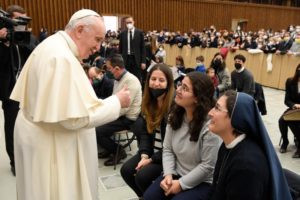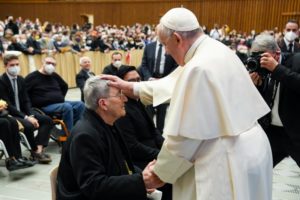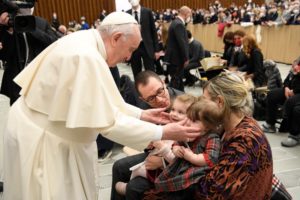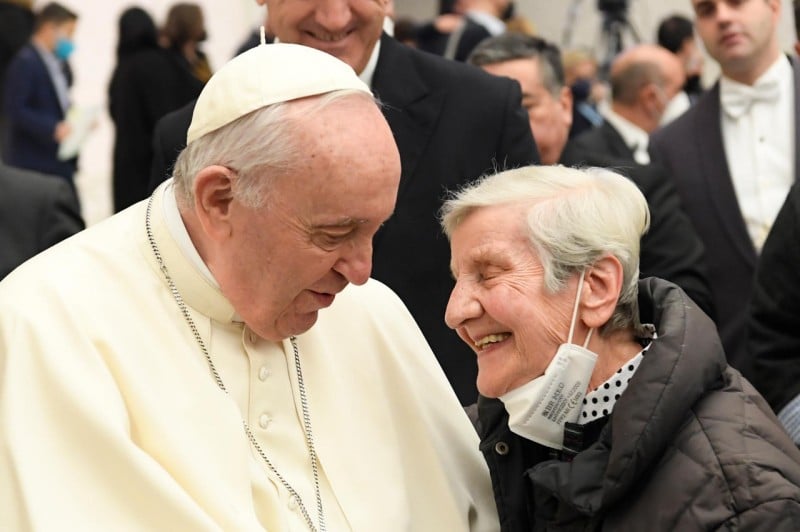“Let us reflect on old age,” Pope Francis called out at today’s General Audience in Paul VI Hall.
“For some decades now, this stage of life has concerned a veritable ‘new people’, the elderly. There have never been so many of us in human history. The risk of being discarded is even more frequent: never have so many as now, been at risk of being discarded.”
With those words, and having last week completed his catecheses on St. Joseph, Pope Francis today began “a catechetical journey that seeks inspiration in the Word of God on the meaning and value of old age.”
The Holy Father lamented the cost of the pandemic to the elderly who, being the weakest and neglected in the early stages of the virus “paid the highest price”. Old age, according to Pope Francis, is right there with migration as an urgent issue facing the world.

“Youth is beautiful, but eternal youth is a very dangerous illusion,” the pope said. “Being old is just as important – and beautiful – is equally important as being young. Let us remember this. The alliance between generations, which restores all ages of life to the human, is our lost gift and we have to get it back. It must be found, in this culture of waste and in this culture of productivity.”
Referring to the prophecy of Joel, the Holy Father stressed the importance of older people continuing to share their dreams and wisdom with young people. He cited the importance of conversation between young and old.
“If grandparents fall back on their melancholies, young people will look even more to their smartphones,” Francis warned. “The screen may stay on, but life will die out before its time.
“Isn’t the most serious backlash of the pandemic precisely in the loss of the young? The old have resources of life already lived that they can call upon at any moment. Will they stand by and watch young people lose their vision, or will they accompany them by warming their dreams? Faced with the dreams of the old, what will the young do?
“In the dialogue between young and old, the old can provide dreams and the young can receive them and carry them forward. Let us not forget that in both family and social culture, the elderly are like the roots of the tree: they have all the history there, and the young are like the flowers and the fruit.”
Following is the Holy Father’s full commentary, provided by the Vatican:
Dear brothers and sisters, good morning!

We have finished the catechesis on St Joseph. Today we begin a catechetical journey that seeks inspiration in the Word of God on the meaning and value of old age. Let us reflect on old age. For some decades now, this stage of life has concerned a veritable “new people”, the elderly. There have never been so many of us in human history. The risk of being discarded is even more frequent: never have so many as now, been at risk of being discarded. The elderly are often seen as ‘a burden’. In the dramatic first phase of the pandemic it was they who paid the highest price. They were already the weakest and most neglected group: we did not look at them too much when they were alive, we did not even see them die. I also found this Charter on the rights of the elderly and the duties of the community: this was edited by governments, it is not edited by the Church, it is a secular thing: it is good, it is interesting, to know that the elderly have rights. It will be good to read it.
Together with migration, old age is one of the most urgent issues facing the human family at this time. It is not just a question of quantitative change; the unity of the stages of life is at stake: that is, the real point of reference for understanding and appreciating human life in its entirety. We ask ourselves: is there friendship, is there cooperation between the different stages of life, or do separation and being discarded prevail?
We all live in a present where children, young people, adults, and the elderly coexist. But the proportion has changed: longevity has become mass and, in large parts of the world, childhood is distributed in small doses. We talked about the winter demographic as well. An imbalance that has many consequences. The dominant culture has as its sole model the young adult, i.e. a self-made individual who always remains young. But is it true that youth contains the full meaning of life, while old age simply represents its emptying and loss? Is that true? Only youth has the full meaning of life, and old age is the emptying of life, the loss of life? The exaltation of youth as the only age-worthy of embodying the human ideal, coupled with contempt for old age as frailty, decay, disability, has been the dominant image of twentieth-century totalitarianism. Have we forgotten this?

The lengthening of life has a structural impact on the history of individuals, families, and societies. But we must ask ourselves: is its spiritual quality and its communal sense consistent with this fact? Perhaps the elderly need to apologize for their stubbornness in surviving at the expense of others? Or can they be honored for the gifts they bring to everyone’s sense of life? In fact, in the representation of the meaning of life – and precisely in so-called ‘developed’ cultures – old age has little incidence. Why? Because it is regarded as an age that has no special content to offer, nor the meaning of its own to live. What is more, there is a lack of encouragement for people to seek them out and a lack of education for the community to recognize them. In short, for an age that is now a decisive part of the community space and extends to a third of the entire life span, there are – at times – care plans, but not projects of existence. Care plans, yes; but not plans to live them to the full. And this is a void of thought, imagination, and creativity. Underneath this thinking, what makes a vacuum is that the elderly, the elderly are waste material: in this culture of waste, the elderly are like waste material.
Youth is beautiful, but eternal youth is a very dangerous illusion. Being old is just as important – and beautiful – is equally important as being young. Let us remember this. The alliance between generations, which restores all ages of life to the human, is our lost gift and we have to get it back. It must be found, in this culture of waste and in this culture of productivity.
The Word of God has much to say about this covenant. Just now we heard the prophecy of Joel, the one who began today’s Audience: “Your elders shall dream dreams, your young men shall see visions” (3:1). It can be interpreted as follows: when the elderly resist the Spirit, burying their dreams in the past, the young can no longer see the things that must be done to open up the future. When, on the other hand, the old communicate their dreams, the young see clearly what they have to do. Young people who no longer question the dreams of the old, aiming headlong at visions that do not go beyond their noses, will struggle to carry their present and bear their future. If grandparents fall back on their melancholies, young people will look even more to their smartphones. The screen may stay on, but life will die out before its time. Isn’t the most serious backlash of the pandemic precisely in the loss of the young? The old have resources of life already lived that they can call upon at any moment. Will they stand by and watch young people lose their vision, or will they accompany them by warming their dreams? Faced with the dreams of the old, what will the young do?
The wisdom of the long journey that accompanies old age to its close must be experienced as an offer of meaning to life, not consumed as the inertia of its survival. If old age is not restored to the dignity of a humanly worthy life, it is destined to close itself off in a despondency that robs everyone of love. This challenge of humanity and civilization requires our commitment and God’s help. Let us ask the Holy Spirit. With these catecheses on old age, I would like to encourage everyone to invest their thoughts and affections in the gifts it brings and in the other stages of life. Old age is a gift for all stages of life. It is a gift of maturity, of wisdom. The Word of God will help us discern the meaning and value of old age; may the Holy Spirit grant us too the dreams and visions we need.
And I would like to emphasize, as we heard in the prophecy of Joel at the beginning, that the important thing is not only that the elderly occupy the place of wisdom they have, of lived history in society, but also that there be a conversation, that they talk to the young. The young must talk to the elderly, and the elderly to the young. And this bridge will be the transmission of wisdom in humanity. I hope that these reflections will be of use to all of us, to carry forward this reality that the prophet Joel said, that in the dialogue between young and old, the old can provide dreams and the young can receive them and carry them forward. Let us not forget that in both family and social culture, the elderly are like the roots of the tree: they have all the history there, and the young are like the flowers and the fruit. If the juice does not come, if this ‘drip’ – let’s say – does not come from the roots, they will never be able to flourish. Let us not forget the poem I have said many times: “All that the tree has that flourishes comes from what it has buried” (“… what the tree has that flourishes lives on what it has buried”, Francisco Luis Bernárdez). Everything beautiful that society has is related to the roots of the elderly. For this reason, in these catecheses, I would like the figure of the elderly person to come up, to understand well that the elderly person is not a waste material: he/she is a blessing for society. Thank you.
________________________________________
Special Greetings
I greet the English-speaking pilgrims and visitors taking part in today’s Audience, especially the groups from England, Ireland and the United States of America. Upon all of you and your families, I cordially invoke the joy and peace of our Lord Jesus Christ. God bless you!
__________________________
APPEAL
My heart aches greatly at the worsening situation in Ukraine. Despite the diplomatic efforts of the last few weeks, increasingly alarming scenarios are opening up. Like me, many people all over the world are feeling anguish and concern. Once again the peace of all is threatened by partisan interests. I would like to appeal to those with political responsibility to examine their consciences seriously before God, who is the God of peace and not of war; who is the Father of all, not just of some, who wants us to be brothers and not enemies. I pray that all the parties involved refrain from any action that would cause even more suffering to the people, destabilizing coexistence between nations and bringing international law into disrepute.
And now I would like to appeal to everyone, believers and non-believers alike. Jesus taught us that the diabolical senselessness of violence is answered with God’s weapons, with prayer and fasting. I invite everyone to make next 2 March, Ash Wednesday, a Day of Fasting for Peace. I encourage believers in a special way to dedicate themselves intensely to prayer and fasting on that day. May the Queen of Peace preserve the world from the madness of war.
_______________________________________
Summary of the Holy Father’s words:
Dear Brothers and Sisters: Today begins a new series of weekly catecheses on the meaning and value of old age, viewed in the light of God’s word. Increased longevity has led to growing numbers of elderly persons in our midst, and thus a need to reflect anew on the relationship between the generations. Our throwaway society often exalts youthfulness and even dismisses the elderly as an unwanted burden. It is important, then, to consider and value the spiritual fruitfulness that this time of life can bring to the elderly themselves, as well as the gifts that they can offer to the communities of which they are an integral part. In this sense, we need to rediscover the “covenant” that unites the generations in looking to the future of our human family. The prophet Joel speaks of a time when “the elderly shall dream dreams and the young see visions” (cf. Joel 2:28). In these days of pandemic, we have come to see once more how important it is to offer our young people wise guidance, hope and enthusiasm as they look to the future. As we begin these reflections, let us ask the Holy Spirit to help us understand and appreciate the great contribution that the elderly can make to a just and fraternal society.
© Libreria Editrice Vatican










